Related Research Articles

Zacharias Topelius was a Finnish author, poet, journalist, historian, and rector of the University of Helsinki who wrote novels related to Finnish history.

Jean Sibelius was a Finnish composer of the late Romantic and early-modern periods. He is widely regarded as his country's greatest composer, and his music is often credited with having helped Finland develop a stronger national identity when his country was struggling from several attempts at Russification in the late 19th century.
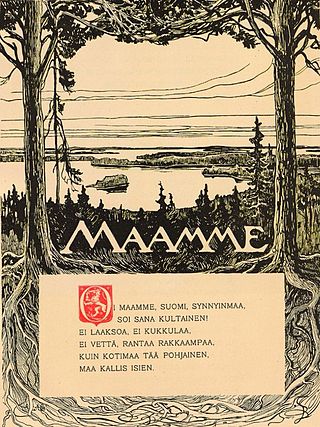
"Maamme" is the de facto national anthem of Finland. The music was composed by the German immigrant Fredrik Pacius, with original Swedish lyrics by Johan Ludvig Runeberg. It was first performed with the current melody and lyrics on 13 May 1848. Originally, it was written for the 500th anniversary of Porvoo, and for that occasion it was Runeberg himself who wrote the music.

Fredrik Pacius was a German-Finnish composer and conductor who lived most of his life in Finland. He has been called the "Father of Finnish music".
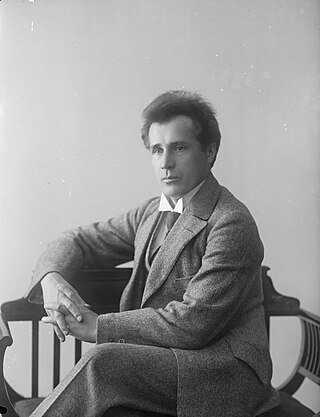
Leevi Antti Madetoja was a Finnish composer, music critic, conductor, and teacher of the late-Romantic and early-modern periods. He is widely recognized as one of the most significant Finnish contemporaries of Jean Sibelius, under whom he studied privately from 1908 to 1910.

The origins of Finnish opera can be traced to the late 18th or 19th century, when the first opera performances were staged in Finland. It is generally assumed that the first opera performance in Finland took place in 1768 in Turku, when the troupe of Carl Gottlieb Seuerling presented the opera Adam und Eva by Johann Theile. However, other sources state that there was no orchestra at this performance.
Jonathan Dove is an English composer of opera, choral works, plays, films, and orchestral and chamber music. He has arranged a number of operas for English Touring Opera and the City of Birmingham Touring Opera, including in 1990 an 18-player two-evening adaptation of Wagner's Der Ring des Nibelungen for CBTO. He was Artistic Director of the Spitalfields Festival from 2001 to 2006.
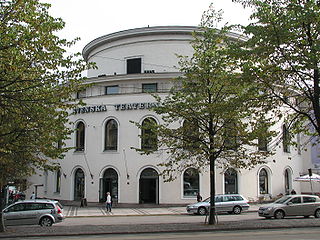
The Swedish Theatre is a Swedish-language theatre in Helsinki, Finland, and is located at the Erottaja square, at the end of Esplanadi. It was the first national stage of Finland.

The Building of the Boat was a projected Wagnerian opera for soloists, choir, and orchestra that occupied the Finnish composer Jean Sibelius from 8 July 1893 to late-August 1894, at which point he abandoned the project. The piece was to have been a collaboration with the Finnish author J. H. Erkko, whose libretto adapted Runos VIII and XVI of the Kalevala, Finland's national epic. In the story, the wizard Väinämöinen tries to seduce the moon goddess Kuutar by building a boat with magic; his incantation is missing three words, and he journeys to the underworld of Tuonela to obtain them. In July 1894, Sibelius attended Wagner festivals in Bayreuth and Munich. His enthusiasm for his own opera project waned as his attitude towards the German master turned ambivalent and, then, decisively hostile. Instead, Sibelius began to identify as a "tone painter" in the Lisztian mold.
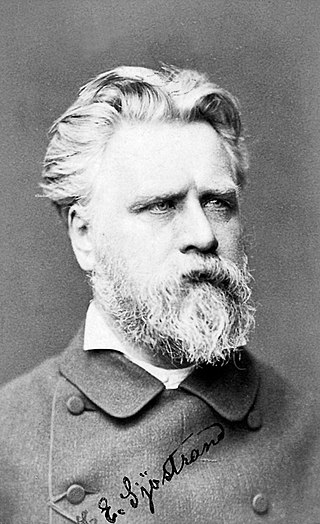
Carl Eneas Sjöstrand was a Swedish sculptor who worked for over 40 years in the Grand Duchy of Finland.

The Academic Male Voice Choir of Helsinki, abbreviated AS, colloquially also known as Akademen, is a Finland-Swedish academic male-voice choir in Helsinki, Finland. The choir was founded in 1838 by Fredrik Pacius and is the oldest extant choir in Finland. It is one of two male-voice choirs affiliated with the University of Helsinki, the other being the oldest extant Finnish-language choir, the YL Male Voice Choir. Furthermore, it is one of two Swedish-language choirs affiliated with the University of Helsinki, the other being the Academic Female Voice Choir Lyran.

The Maiden of the North is an opera in three acts written in 1898 by the Finnish composer Oskar Merikanto. The piece was a collaboration with the Finnish author Antti Rytkönen, the Finnish-language libretto of whom was based on a script by the Finnish opera singer Lorenz Nikolai Achté. The opera tells a story from The Kalevala, Finland's national epic, in which the old wizard Väinämöinen and the blacksmith Ilmarinen, as rival suitors, vie for the hand of the beautiful Maiden of Pohjola; she is the daughter of Louhi, the villainous Queen of the Northland. Although rarely performed, The Maiden of the North retains a degree of historical significance as the first Finnish-language opera.

Björneborgarnas marsch is a Swedish military march from the 18th century. Today, it is mainly performed in Finland and has served as the honorary march of the Finnish Defence Forces since 1918.
Kung Karls jakt is an opera with music by Fredrik Pacius and a libretto by Zacharias Topelius. It was the first opera to be composed in Finland. Kung Karls jakt was first performed in Helsinki on 24 March 1852. Although the text is in Swedish it concerns an event from Finnish history when Finland was a province of Sweden in the 17th century. The work takes the form of a Singspiel with spoken dialogue between the musical numbers. The music is heavily influenced by contemporary German and Italian opera, with a few Finnish elements such as the use of a kantele in one scene.

The Maiden in the Tower, JS 101, is an opera in one act—comprising an overture and eight scenes—written in 1896 by the Finnish composer Jean Sibelius. The piece was a collaboration with the Finnish author Rafael Hertzberg, the Swedish-language libretto of whom tells a "simple tale of chivalry" that may nonetheless have had allegorical ambitions: the Bailiff abducts and imprisons the Maiden ; although she endures hardship, she remains true to herself and is freed subsequently by her Lover and the Chatelaine of the castle.
Glenda Dawn Goss is an American author and music historian whose special interests are music and culture, early modernism, critical editing, and European-American points of cultural contact. Her most notable work has revolved around the life and works of the Finnish composer, Jean Sibelius.
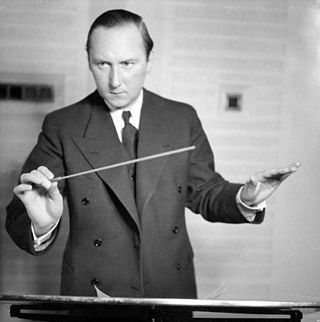
Prinsessan av Cypern, Op. 9, is an opera in four acts written from 1931 to 1936 by the Swedish composer Lars-Erik Larsson; the Swedish-language libretto is by Finnish author and playwright Zacharias Topelius. The opera premiered in Stockholm on in 29 April 1937, but was withdrawn subsequently by the composer.
Tomi Matti Mäkelä is a Finnish musicologist and pianist, professor at the Martin-Luther-Universität Halle-Wittenberg in Germany. He studied music and musicology in Lahti, Vienna, Berlin (West) and Helsinki. As a pianist he studied with Rauno Jussila and Noel Flores. He got his doctoral degree 1988 in Berlin under the guidance of Carl Dahlhaus. He has published widely on the music of the nineteenth and twentieth century. His German book on Sibelius Poesie in der Luft got the award Geisteswissenschaft international 2008 and was published in English translation by Steven Lindberg as Jean Sibelius (2011). 2023 Tomi Mäkelä received the Fredrik-Pacius-Award of the Swedish Literature Society in Finland.
Skrifter utgivna av Svenska litteratursällskapet i Finland is a book series in Swedish, published in Finland since 1886 by the Society of Swedish Literature in Finland (SLS). The main series reached number 734 in the year 2010. The series has several sub-series with own themes and numbering. Several of the publications have been digitised and made freely available by the National Library of Finland.
References
- ↑ Fredrik Pacius. In: The New Grove Dictionary of Opera. Macmillan, London and New York, 1997.
- 1 2 3 Pacius website. http://www.pacius.fi/en/index.html
- ↑ Programme with libretto http://www.kypronprinsessa.fi/pdf/Kypron_prinsessa_RUOTSI.pdf